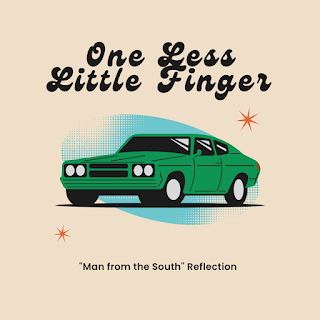One Less Little Finger: "Man from the South" Reflection
In the short story, "Man from the South," we are introduced to an interesting bet being taken place between an elderly man and a young American Soldier. If the soldier can strike his lighter successfully ten times in a row, he gets the elderly man's Cadillac. However, if he fails... he loses his little finger on his left hand. The American soldier willingly took on the bet, not thinking anything of how losing his little finger on his non-dominant hand would genuinely affect him. With luck, the bet could not fully take place so there was no winner or loser. Let's say the bet did take place and he lost. His daily occupations would have been heavily impacted whether it be your dominant hand or not. As his occupation is being a soldier in training, he does not realize that he would need the little finger to be able to grip successfully. It is important all digits in the hand are present as that allows for a strong and firm grip and being able to hold on to items with strength. The ulnar side where the little finger is located also allows for increased mobility, which is also important for gripping. If he lost his little finger, he would not be able to grip different things, especially if they are all different shapes. Holding on to a gun would be difficult as well as grabbing bags or even turning a door knob. Each of these example items holds a different shape (cylinder, hook, spherical) and requires a firm grip from all digits. Not only would it affect his actual occupation but it would affect his ADLs and iADLs and would make it difficult to cook, clean, complete self-hygiene, play football if that is one of his hobbies, and so much more.
One of the soldiers' occupations that seemed important to him was smoking a cigarette. Not that I like to condone smoking, but this is one of his occupations that he seems to enjoy and if I were to tell him to quit, it could potentially lead to occupation deprivation. This is something the OTPF states to not overlook when working with the client as it falls under the performance pattern, which is also under the area of domain. If he lost his little finger, he would have a hard time gripping the cigarette and would not be able to firmly grip it. A tool he could use is a cigarette gripper shown below and it would make it easy for him to either grip with one finger or to even put the gripper on a stable surface so he does not have to hold onto it. This way he is still enjoying one of his habits that he has stuck with.
The plot twist in the short story was the elderly man's wife interrupted the bet that was occurring, which is why there was no way to declare who the winner and loser were. Toward the end of the story, we find out she actually has only one finger and a thumb. This definitely affects her routines and occupations, especially when it comes to gripping as well as pinching her digits together. She probably has issues with her ADLs and iADLs, especially those involving getting ready, bathing, doing hair, and other hobbies and interests she might also have. As she comes a bit late into the story, we come to find that she has an interest in maintaining hair health. Since she mentions she was coming back from getting her hair washed by someone, a piece of equipment I would offer to make this job easier and a bit more independent is an adaptive hair-washing tool with a handle. I would even add an adjustable strap she could put around the handle so she does not have to grip as firmly since the bristles will do all the work. This way she will be more independent in completing her routine.






Lovely analysis, Pinal! You're writing style is very professional, but you do a great job of simplifying biomechanical concepts so that the general public would be able to understand! Given what we've learned in anatomy and pathology, we know how dangerous smoking is for overall health and that it is a causative factor for so many conditions. As occupational therapists, we are supposed to encourage healthy habits and lifestyle changes, but we are also supposed to value the client and occupations are important to them. This brings up a moral dilemma. Don't get me wrong, the cigarette holder is an extremely creative adaptive tool! However, should we as OT's encourage the soldier to continue that behavior? How do we decide whether to prioritize client health or happiness?
ReplyDeleteThank you Lindsey! Also, I completely agree with you regarding the smoking habits. Don't get me wrong, I would of course advise him to stray away from that, but from learning in class that we cannot really force clients to change their habits, it is really up to him to decide if they would like to quit or not. It is definitely a moral dilemma. It isn't that I would encourage it but if that is the life he wants to live, I cannot be the one to force him to stop. Thank you for bringing that up! It is definitely a challenge we as future OT Practitioners will face.
DeleteI love the mention of occupation deprivation. I agree that he would be deprived of meaningful occupations due to this injury and its important to consider even the habits that are bad because they affect his daily life. I also love the modification for the man' wife. Washing her hair seems to be greatly important, especially since she is paying others to do it since she cannot. If she was able to do it herself with adaptive equipment, I believe she would benefit greatly. As always, lovely blog and lovely thoughts.
ReplyDelete